New Features PowerPoint PPT Presentation
1 / 12
Title: New Features
1
New Features
- 6.0
2
Whats new?
- Cpk Advisor analysis
- Out-of-control summary
- Chart Review
- Chart Slideshow
- New user privilege
- Images in chart titles
- Improved installation
3
1. Cpk Advisor analysis
- With any histogram, SQCpack can generate and
display a capability analysis. This analysis is
customized for the specifics of each histogram. - The text based analysis and interpretation is
easy to read, includes the relevant statistics,
and can be printed or saved as a file.
4
1. Cpk Advisor analysis
- To get to the Cpk Advisor analysis, go to File,
from a histogram, Save Cpk Advisor analysis.
Click here for a sample of the CPK Advisor
analysis
5
How the Cpk Advisor analysis works
- The output from a Cpk Advisor Analysis is a web
page file (.htm file). When you click OK to view
the analysis, your web browser will be launched.
It will display the contents of the Cpk Advisor
Analysis output file. - To create the output file, the software uses one
of several template files. These templates are
stored in the \SysData folder under the folder
where you installed SQCpack. The main template is
named CpkWebTemplate.htm and there are some
template fragments that are also used. They have
names like CpkDetails1.txt, CpkDetails2.txt, etc.
- Depending on the statistics that get calculated,
the output file will be based on the main
template and one of the template fragments. - You may customize the main template. For example,
you could put your company logo on the page. Be
sure to make a backup copy of the original before
you begin making changes. - Note that a Cpk Advisor Analysis can also be
generated by a command line parameter.
6
2. Out-of-control summary
- The out-of-control summary allows you to quickly
scan many control charts and then view them as a
ranked list. The charts at the top of the list
are those with the highest count of
out-of-control conditions. Double click to
display only the charts that need attention. If
everything is OK, why look at the chart?
7
2. Out-of-control summary
- To use the Out-of-control, OOC, summary from the
workspace, right-click to display the context
menu, then select Display out-of-control summary
from the menu. The out-of-control summary dialog
box will be displayed.
For additional help see Help gt User Guide (PDF)
8
OOC summary form settings
- When the dialog box is first displayed, it shows
your charts in the same order they are in the
workspace. Under the column named Number
out-of-control you will see question marks. Once
the charts are evaluated, you will see numbers in
place of the question marks. Note that you may
resize each column displayed in this form.
SQCpack will remember your preferences and show
them with the new size from now on. - Refresh every The out-of-control summary form
can be set to refresh the list of charts every so
often. This is useful in situations where you
have a regular flow of data into the groups
underlying the charts in your workspace. Enter a
number here. For example to refresh every hour,
enter a '1'. - Time units Select from the drop down list the
time units for your refresh interval minutes,
hours, etc. - Analyze - Select the Analyze option you prefer.
If you want to look at the number of data rows as
defined by the chart, select Analyze data rows
defined by each chart. If you want each chart in
the workspace to look back the same number of
rows, then select Analyze Last N rows where N is
and then be sure to enter a value for N. - NOTE You may leave the Refresh every and Time
units empty if you do not want to use the
automatic refresh option. - Start Click this button to have the OOC Summary
evaluate and rank your charts. If you are using a
refresh interval, then the list will be evaluated
and resorted at each interval until you close the
window or click Stop. - Once OOC Summary has evaluated the charts in your
workspace it will reorder them so the charts
having the highest number of out-of-control
conditions show at the top of the list. - At any time you may view the actual chart by
double clicking on it in the list or selecting
Chart Display from the menu. When you close the
chart, the OOC Summary form will still be visible.
9
3. Chart Review
- Chart Review allows you to efficiently review all
charts in a group, or in a workspace. - To view the charts from a workspace, right-click
on the name of the workspace and select Chart
Review. - While viewing any chart, use the PgDn and PgUp
keys to easily browse through all related charts.
10
4. Chart Slide show
- This allows you to have a set of charts displayed
in a continuous loop where an updated chart is
displayed every few seconds. This makes it easy
to set up a visual chart monitoring station that
keeps important metrics both visible and up to
date.
To use this feature follow the Chart Review steps
and select Review gt Slide show Then enter
the slide show interval in seconds.
11
5. New user privileges
- New user privileges allows you to control which
data entry form is used. The regular data entry
form or the real-time charting form or both can
now be set on a per user basis.
To activate user-security and change user
privileges see Help gt User Guide (PDF)
12
6. Images in chart titles
- A new chart title code _at_IMAGE allows you to embed
graphics such as company logos or diagrams in any
chart title position. - Supported graphic formats are .BMP, .JPG, .PNG,
.WMF, and .EMF.
To properly embed a graphic see Help gt User Guide
(PDF)

